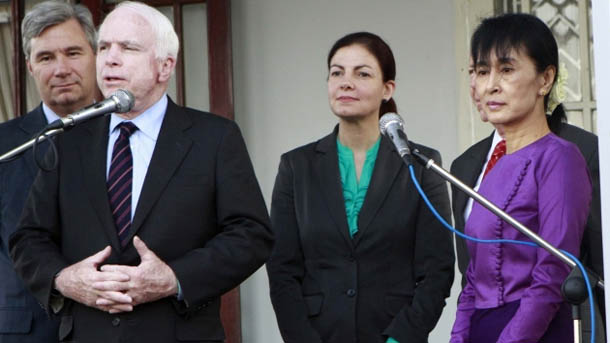WASHINGTON, DC — Top American lawmakers have called for renewal of sanctions on Burma and said that this is not the right time to issue waivers to US companies for new investments in the Southeast Asian nation.
Identical pieces of legislation were issued in both chambers of the US Congress—the Senate and the House of Representatives—last week wherein several top lawmakers reviewing current situation in Burma said that this is not the right time for US companies to make fresh investment in the country.
“I urge the administration to refrain from issuing waivers at this time for new US investment in Burma’s oil and gas industry until Aung San Suu Kyi’s concerns with MOGE [Myanmar Oil and Gas Enterprise] are sufficiently addressed,” Sen John McCain said, even as he noted that he supports the Obama administration’s decision to suspend sanctions on US investment in Burma.
Renewing the Burmese Freedom and Democracy Act would leave intact the import ban against Burmese goods, thus maintaining leverage the executive branch can utilize to help prompt further reform, said Mitch McConnell, the Senate Republican leader, reintroducing the bill in the Senate last week.
“Reauthorizing this measure would permit the executive branch, in consultation with Congress, to calibrate sanctions as necessary, thus preserving its flexibility,” he said in his remarks on the floor of the Senate. The bill has been reintroduced by several US senators, a similar version of which has also been reintroduced in the House of Representatives.
“The Burmese government still has not met all the necessary conditions to justify a complete repeal of all existing sanctions. Despite the unmistakable progress made by the Burmese government, now is not the time to end our ability either to encourage further governmental reform or to revisit sanctions if necessary. As Suu Kyi herself has cautioned, the situation in Burma is ‘not irreversible.’ Serious challenges need to be addressed,” McConnell said.
“Violence in Kachin State remains a serious problem. Numerous political prisoners remain behind bars. The constitution is still undemocratic. The regime’s relationship with North Korea, especially when it comes to arms sales with Pyongyang, remains an issue of grave concern,” the senator said.
McConnell said renewing the Burmese Freedom and Democracy Act will leave undisturbed the process for suspending sanctions announced three weeks ago. “In part for this reason, the State Department supports renewal of this measure. In fact, a vote for reauthorization of the Burmese Freedom and Democracy Act should be seen as a vote to support the administration’s easing of sanctions and a vote to support reform efforts in Burma,” he said.
Sen Diana Feinstein, who co-sponsored the legislation, said even though remarkable changes have taken place in Burma after years of violence and repression, the government of Burma still has a lot of work to do to demonstrate to the international community, and, above all, the people of Burma that it is truly committed to reform, democratization and national reconciliation.
“We should renew this ban for another year as an incentive to the government of Burma to continue on the path it has undertaken and take additional actions,” she said. “The fact of the matter is, the reforms are not irreversible and the government of Burma still needs to do more to respond to the legitimate concerns of the people of Burma and the international community,” the senator said.
Feinstein said McConnell has recently spoken with Aung San Suu Kyi directly about this matter and she supports renewing the import ban for another year. “I believe that renewing this ban will help keep Burma on the path to full democratization and national reconciliation and support the work of Suu Kyi, the democratic opposition, and the reformists in the ruling government,” she said.
“It will give the administration additional leverage to convince Burma to stay on the right path. The administration will still have the authority to waive or suspend the import ban as it has suspended sanctions on investment and financial services if the government of Burma took the appropriate actions,” the senator said.
“If we let the import ban expire, however, and Burma backslides on reform and democratization, we would have to pass a new law to re-impose the ban. By passing this joint resolution, we ensure that the administration has the flexibility it needs to respond to events in Burma as it has done so with financial services and investment,” Feinstein said.
McCain hoped that Suu Kyi and her fellow members of Parliament in Burma can work legislatively to reform the country’s state-owned enterprises, especially MOGE, and to make their operations fully accountable to Burma’s elected leaders and fully consistent with international standards, such as the International Monetary Fund’s Code of Good Practices on Fiscal Transparency.
Calling on the Obama administration to refrain from issuing waivers for new US investment in Burma’s oil and gas industry, McCain said, “I also urge the administration to push our European allies to do the same. This is an important case in which continued principled US leadership is needed.”
















